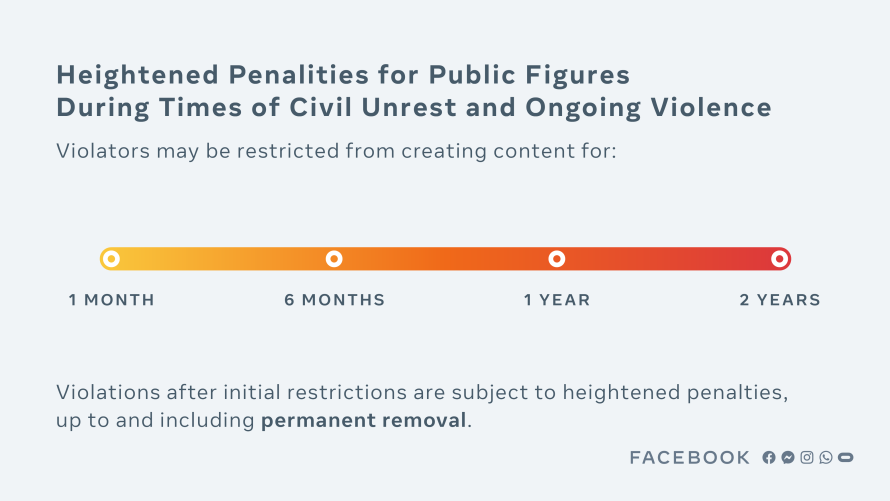Facebook says elected officials should investigate its role in January 6
Justin Hendrix / Jun 4, 2021In an announcement by its Vice President of Global Affairs, Nick Clegg, Facebook said former President Donald Trump will remain suspended from the platform for his actions related to the violent siege at the US Capitol on January 6. Clegg stipulated the period of the suspension will be two years, the "highest penalty available" under new enforcement rules the company released today.
But, the company said it would not launch any new investigation into its own role in propagating disinformation or facilitating the coordination of the insurrection on January 6, instead citing its ongoing efforts related to such questions with 20 selected academic researchers and calling on "elected officials" to lead "an objective review of these events, including contributing societal and political factors" that led to the violence that day.
"The responsibility for January 6, 2021 lies with the insurrectionists and those who encouraged them, whose words and actions have no place on Facebook," the company said in its statement. At issue, of course, is the fact that both the words and actions of many of the insurrectionists and the political leaders and influencers that incited them were indeed on Facebook, as the company's own internal review, first revealed by BuzzFeed, previously acknowledged.
Today's announcement came in response to recommendations by the Facebook Oversight Board, a quasi-independent body Facebook established to review its policies and decisions. On May 5, 2021, the Oversight Board upheld Facebook’s suspension of former President Donald Trump, who was suspended from the platform hours after inciting a violent white supremacist insurrection at the United States Capitol to interrupt the certification of Electoral College votes that sealed his defeat in the 2020 Presidential Election.
But, the Oversight Board found that “it was not appropriate for Facebook to impose the indeterminate and standardless penalty of indefinite suspension,” since “Facebook’s normal penalties include removing the violating content, imposing a time-bound period of suspension, or permanently disabling the page and account.” The Oversight Board made a variety of additional recommendations to Facebook; Clegg's announcement included a response to each of them.
One of the key recommendations the Oversight Board made was that Facebook should "review its potential role in the election fraud narrative that sparked violence in the United States on January 6, 2021 and report on its findings." Facebook indicated it would implement this recommendation in part, and that "independent researchers and our democratically elected officials are best positioned to complete an objective review of these events."
Facebook pointed to an effort already underway with outside academics to look at the role its platforms played in the 2020 election. It noted that in light of the events of January 6, the company extended the data collection it provided to a selected group of researchers through the end of February 2021. "This extension will allow researchers to better understand people's beliefs and opinions around events including the presidential transition, the violence at the Capitol on January 6, and the Inauguration," the company said. Results from these studies are expected emerge early next year.
But the February cutoff may mean independent researchers do not have access to observe or study ongoing use of the platform to advance false claims or narratives related to the 2020 election, or to assess the size of the insurrectionist movement. And, it is unclear whether evidence the company has removed or deleted in its moderation has been preserved for future investigations.
"What we need is a human rights locker approach that is regulated. If social media companies delete data in response to a crisis, that information should be made available to researchers and government investigators so that the evidence can be properly preserved," said Joan Donovan, Research Director of the Shorenstein Center on Media, Politics and Public Policy at Harvard's Kennedy School. "The information that goes up online is in the public domain until it isn't. At this stage the company should put that data into the public domain, or at least behind an access point so that government and researchers can put the pieces back together. We face a profound threat to our democracy, and we do not have the data available to make that assessment. "
Indeed, the company also reported it had taken substantial action to remove a variety of problematic groups, pages and profiles, and indicated it will continue to "cooperate with law enforcement and any US government investigations related to the events on January 6." But, the company reiterated, "an objective review of these events, including contributing societal and political factors, should be led by elected officials."
The status of further government investigations into January 6 is currently up in the air. A proposal that passed with substantial bipartisan support in the House of Representatives died in the Senate. Whether the House will continue investigations in various committees or establish a Select Committee is still unclear. President Joe Biden has dismissed the notion of an investigation led by the executive branch.

Facebook also made an update to its "newsworthiness allowance," which allows for some content that would otherwise violate community standards to remain visible if it is deemed to be of sufficient public interest, and announced a scale of "heightened penalties for public figures during times of civil unrest and ongoing violence" that suggests the Trump suspension is the most severe under its clarified rules.
Facebook's decision today opens the possibility Trump could be reinstated on the platform ahead of the 2024 election cycle. Twitter has said its suspension is permanent. YouTube has stated it may reinstate the former President when it deems the danger of civil unrest has passed.
Authors
